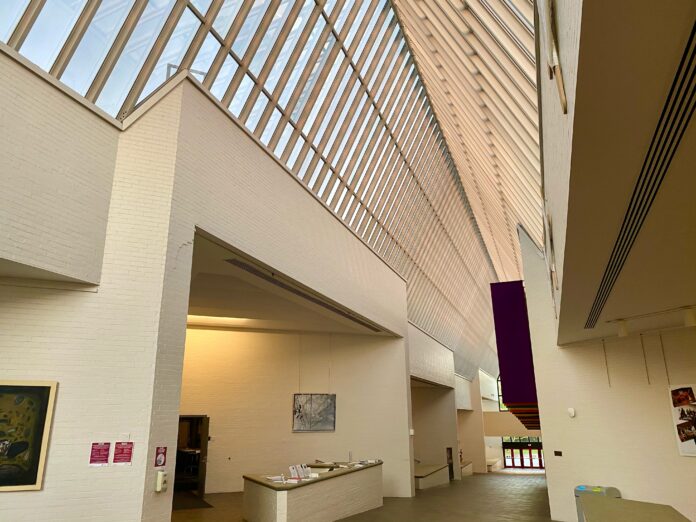The music department at Muhlenberg continues to adapt to a multitude of obstacles while virtually teaching music to a variety of students. The music department has a wide and vast range of components for both instrumental and vocal prodigies. Ted Conner, Ph.D, the department chair, and the rest of the faculty are fully committed to providing a strong pedagogical strategy for everyone who wishes to grow their talents.
The hard work of the professors and staff in the music department is apparent as they juggle all of these moving pieces while trying to teach students. Vincent Trovato, a lecturer and staff accompanist at the College, offered more insight on this challenge and how he has handled the new normal. Trovato offers a completely virtual and remote class so this has both its drawbacks and positives. The professor feels it is most beneficial to have a loose and casual structure so the students can develop with the content. Additionally, Trovato also offers outside meetings to ensure that he can personally check in with students who are willing and able to meet outside of class.
The humanity of online teaching is extremely important for all professors, and especially for the music department. Trovato commented, “It is more difficult connecting with students in an online format, although much easier to learn their names. So, more than I might have before, I try to engage with students on a personal level as they enter a zoom session: conversations about their majors, schoolwork, where they’re from, background, interests, etc.”
Since students no longer walk into class and converse with each other freely in the classroom, it’s important to have these moments of connection and understanding, especially before performing together. The most important thing is that students continue to practice with their instruments and vocal abilities to make sure they can be the best they can be. Trovato feels it is best to focus more on participation with his syllabus and to offer less homework. The other virtual tools all provide a wide range of variety in lessons and for continual changes to be made to the course and the way it is presented. This spotlight on the students’ lives and their personal work is extremely important to fully understand how they have been able to adjust to the current situation.
The music department is not limited to just coursework as it also includes various ensembles and individual lessons as well. Students interested in developing their musical skills and performing what they love to do have a wide range of both instrumental and vocal ensembles to choose from. Joseph Edore ‘24 said, “I found that music at Muhlenberg consists of so many talented and introspective artists sharing the same passion; a truly welcoming and exciting community of people. There were really unique ensembles to join (for myself, percussion and jazz), music theory classes and individual lessons.”
Edore is currently studying from home and feels it is running smoothly, though he does miss the in-person interactions and lessons. He explained that, before the pandemic, professors could tell him to correct his posture or movement of his hands while playing the piano when working in person. This same level of attention is not possible via the virtual barrier. Edore did mention how his professor has also adapted to the times with their purchase of a laptop and the efficient utilization of the tools at their disposal, such as screen sharing.
Abigail Schechter ‘24 is another student who is living on campus and managing her coursework while performing in the Muhlenberg Women’s Ensemble and participating in voice lessons. The work of these musical passions have evolved to reflect this current pandemic, especially as some courses and functions still operate remotely even though everyone is back on campus. The Women’s Ensemble has advanced with the distanced learning by using a brand new software system to allow each member of the ensemble to record their tracks and share them to the same place. This then allows for these tracks to then be layered over and have some sense of singing together.
Schecter mentioned how she utilizes various outside applications to keep in touch with the songs and sheet music during lessons. She has downloaded three separate applications to make sure she is in tune for lessons and can properly warm up. Despite the social distance and remote gatherings, the virtual platform has also allowed for various positives when trying to learn and master the art of music. Schecter mentioned how the lessons feel much more relaxed and comfortable thanks to the virtual atmosphere and by working in a selected space. This allows for less stress and for the student to not to rush anywhere or try to impress anyone.
Overall, virtual learning has not stopped the musical talents and abilities of the Muhlenberg faculty and students as they continue to advance with the times. Professors have worked effortlessly to make sure students are handling the coursework and growing with their instruments. Students continue to work hard and put their best foot forward to ensure they practice and develop their talents. Who knows when the world will go back to normal, but at least music always remains the same.
Johnny '24 is a Theatre and Media and Communication double major at 'Berg. He loves to highlight the voices of artists across campus and to showcase the wide variety of events at Muhlenberg. He likes to think he is funny, but that is up for debate.























